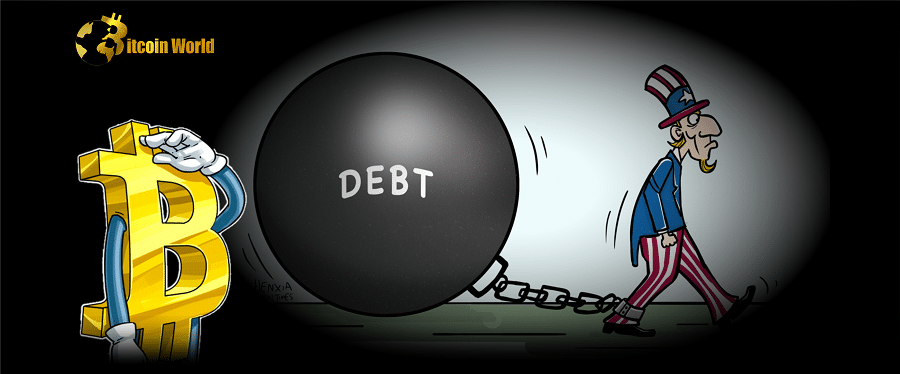Could cryptocurrencies be facing its most difficult test yet?
A government’s failure to satisfy its financial commitments is referred to as a debt default. This essay will look at how a US debt default would affect the bitcoin market. While a debt default is unthinkable in America’s hotly contested politics, nothing is off the table. As a result, it is still critical to comprehend the ramifications of a debt default.
When the government is unable to fulfill its financial commitments, a debt default occurs. This might occur for a variety of causes, such as a shortage of cash, political deadlock, or a drop in investor confidence. The government may opt to create additional money, restructure its debt, or default entirely in the case of a debt default.
The United States borrows money to fund a variety of projects and activities, including infrastructure, national security, social services, and others. The revenue generated by taxes and other sources is frequently insufficient to meet the costs of these programs, so the government borrows money to make up the gap. As a result, the national debt is expanding, and it already exceeds $31 trillion. The government must borrow money on a regular basis in order to fund continuing activities and pay interest on the debt.
The majority of US debt is owned by domestic institutions such as the Federal Reserve, government-sponsored companies, and private investors such as mutual funds and pension funds. Foreign countries own a considerable amount, with China and Japan being the top foreign holders of US debt. China alone currently owns more than $1.5 trillion in US Treasury securities. Ireland, Brazil, and the United Kingdom are among the other prominent foreign holdings. The US government pays interest on this debt on a regular basis.
A default on US debt would almost certainly have a large impact on traditional financial markets, such as equities, bonds, and commodities. Stock prices would almost certainly plummet as investors panicked and sold their holdings. Bond prices would most certainly decline as the debt’s worth fell. Commodity prices, such as gold and silver, may decline as investors seek safer investments.
If the United States defaulted on its national debt, the global financial system would suffer severely. The US dollar is now the main international reserve currency, but a default would entail a loss of trust in the dollar, allowing alternative currencies, such as the Chinese yuan or even Bitcoin, to gain momentum as a world reserve currency.
In recent years, the Chinese yuan has grown in popularity as a reserve currency. Because of China’s expanding economic impact and the Chinese government’s aspirations to internationalize its currency. In the case of an American debt default, the yuan may become a more appealing alternative to the US dollar for central banks and investors.
And, from a political standpoint, this would be consistent with Beijing’s long-term goal of replacing the dollar with the RMB. A US government default would provide China with a fantastic chance to make its case, both politically and economically.
A US debt default would have a more complicated impact on the bitcoin market. On the one hand, as a safe haven, investors may rush to cryptocurrencies, pushing up prices. The volatility in traditional financial markets, on the other hand, may lead to a decline in overall demand for cryptocurrencies, causing prices to plummet. Furthermore, as nations seek measures to stabilize their economies, a US debt default might lead to increasing regulation of cryptocurrencies.
The cryptocurrency market’s long-term ramifications of a US debt default are impossible to anticipate. We are in unknown territory since the United States has never defaulted on its debt commitments.
In an ideal world, cryptocurrencies would emerge as a reliable and trustworthy alternative to established financial markets. In the worst-case scenario, higher regulation and lower demand might impede bitcoin industry development.
Perhaps bitcoin has a silver lining. A financial default might have a beneficial impact on the bitcoin industry by encouraging more innovation and acceptance. Investors may become wary of traditional financial markets in the case of a default. In addition, look for alternative investing alternatives, such as bitcoin.
This increasing demand for cryptocurrencies may result in a price hike and further push their adoption.
Furthermore, as the desire for a more secure and trustworthy financial system grows, a US debt default might hasten the creation of new and innovative financial products such as decentralized exchanges and stablecoins. This might result in the total bitcoin industry growing.
It is crucial to highlight, however, that a default on American debt would have huge negative effects for the world economy, and the impact on the cryptocurrency market would most likely depend on the precise conditions and severity of the default. Especially given how tightly bitcoin and the cryptocurrency market are linked to Wall Street.
The potential benefits of a US debt default for the cryptocurrency market must be carefully balanced against the risks and uncertainty that it may entail.
In summary, while a default may spur additional bitcoin innovation and acceptance, if the entire economy suffers, it will be a Pyrrhic triumph at best.
A debt default would have serious consequences for financial markets, including the bitcoin market. While it is impossible to forecast the exact impact, it is critical to comprehend the potential repercussions.














